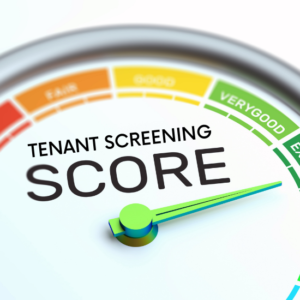Tenants searching for new rental housing are running into a growing and troublesome obstacle – the tenant screening report and tenant screening scores. Thanks to the power of A.I. – artificial intelligence, many “big data” companies now deliver comprehensive combined background/credit reports to landlords in a matter of minutes.
The information in these reports (including criminal records and eviction history) might be outdated or incorrect. You may never know why your rental application was rejected. The nonrefundable cost of these reports (usually $10-$50 each) is usually paid by the hopeful tenant – a further insult when a problematic report results in a rental application denial.
How is a tenant screening report different from a credit report?
Most consumers are familiar with credit reports and credit scores. Your credit score (a number between 300 and 850) is a calculation of your financial well- being. It is based on your on-time payment history, amount of debt and other factors. You have a right to obtain your credit score for free, and dispute or correct information that is wrong. You may even have an app on your phone that gives you access to your credit score at all times.
A tenant screening report aggregates information from nationwide databases to determine your potential as a reliable renter. Detailed credit and criminal history (including sex offenses) are included and prior evictions are noted. Any legal actions brought against landlords are added (even if you prevailed in court).
Past addresses and prior landlord information could be a part of your report. A score between 1 and 1000 is determined, and a low score could repeatedly slow your apartment search. If you do manage to secure a lease, you could be charged larger security deposits or larger move-in costs.
You have a right to see your tenant screening report
The Fair Credit Reporting Act requires tenant screening companies to provide you with a copy of your report. There are hundreds of different companies providing these reports. Trans Union SmartMove, RentPrep, MyRental, RentSpree, Cozy and CoreLogic are just a few examples.
What tenants should know about screening reports
- The Fair Credit Reporting Act (FCRA) requires landlords let you know if they rejected you because of something on your screening report.
- You have the right to request a free copy of your screening report yearly and correct any errors.
- Information in tenant screening reports may vary from company to company depending on data sources used. Ask your landlord which screening company they are using – and then request you own report online.
- If you have a landlord dispute in your background, or an eviction action that was resolved, be prepared to explain this to a potential landlord. Keep documents relating to any issues like this.
- In California consumers may put a “security freeze” on their credit reports. If you deny access to a landlord to screening information, your application could be dismissed as incomplete.
Get out ahead of your Tenant Screening Score
Many households are going through changes due to job loss, the impact of COVID-19 and a troubled national economy. If you think an unfair or incorrect Tenant Screening Report is causing you problems, consult with a knowledgeable tenant law attorney.
Know your rights. Protect Yourself


 (415) 533-0735
(415) 533-0735 (415) 843-0496
(415) 843-0496